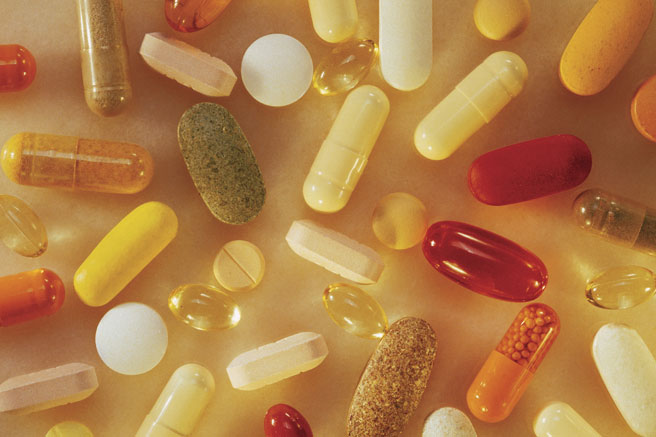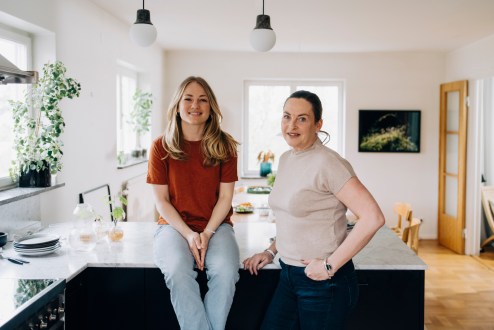To supplement or not to supplement?
Should we or shouldn’t we supplement our diet with vitamin pills? And if so, in which form should we take them? Anastasia Stephens finds out

You’ve been grabbing food on the run. You know that token salad leaf in your burger isn’t really going to give you that nutrient hit your body needs. To make sure you stay on top form, you gulp down a little extra health insurance, in the form of a vitamin pill. It’s tempting to think that if we take a supplement we can exist on a diet of junk food and still be healthy.
As a nation, we guzzle millions of vitamin tablets a year, feeding an industry that now boasts an annual turnover of £860m. Packed with disease-fighting antioxidants, we’re told they’ll top up depleted nutrient supplies, balance our hormones and prepare our bodies for pregnancy. But do these little helpers live up to their claims?
False claims
Recently a study at University College London found that antioxidants (any molecule that neutralises harmful molecules in the body) don’t combat ageing. The researchers fed nematode worms an infusion of antioxidants and found they didn’t live any longer. OK, we are not worms. But many supplements are sold on the back of claims that they contain ‘disease-fighting’, ‘anti-ageing’ antioxidants. Vitamins A, C and E, plant molecules and many minerals have antioxidant properties. Are they as effective as we think? Most people could certainly do with better nutrition and a higher dose of vitamins in their daily diet. Not only do many of us eat less-than-fresh ready-made food, nutritionists claim that stress burns up B vitamins as well as vitamin C at about double the rate than when we’re relaxed.
Then there’s the state of our soils. Acid rain leaches minerals out of the soil while intensive farming has depleted levels to the lowest in recorded history. Government surveys between 1930 and 1990 show that levels of key minerals such as magnesium and selenium in British soils have dropped by 50 per cent. But when it comes to many vitamin supplements, some scientists say we’re being seriously short-changed. Regardless of the antioxidant debate, they claim the nutrients in many pills are in a form that cannot be easily or naturally absorbed. For starters, if you take a vitamin without food, you may find you receive hardly any of its goodness.
Research at the Linus Pauling Institute in the US found that cereal fortified with just 30iu vitamin E boosted blood levels of vitamin E by 15 per cent. Yet when vitamin E pills of 10 times that strength were taken on their own, levels of vitamin E in the blood rose by only three per cent.
Quality not quantity
Meanwhile, when researchers at Canada’s Department of National Health looked at B vitamins, they found that, contrary to the claims, none of the so-called sustained-release vitamins was absorbed any more effectively. And there’s evidence to show that some nutrients, when lumped together in a single pill, fight with one another to be absorbed. For example, if you take vitamin E with iron in the same supplement, one will block the absorption of the other. These findings call into question the effectiveness of many supplements on supermarket shelves.
Yet how many of us buy supplements blindly, without wondering how the vitamins inside the pills are actually made? A key problem seems to be that many mass-market vitamins are vastly different from those found naturally in food or plants.
The same is true of minerals. We’d normally get minerals such as selenium and copper from plants. ‘Absorbed from the soil, their structure will have been altered by plants into a digestible form,’ says Eric Llewellyn, a biochemist who researches food-grade supplements at The Hay Meadow in Tenbury. ‘Yet in many supplements you find minerals in their “rock” form. We aren’t designed to eat rocks. They’re very hard to absorb.’ So should we throw our supplements in the bin? Not necessarily, says Amanda Jennings, nutritionist at Bristol’s Vitality Centre. ‘Even if you eat a healthy diet, it can still be a good idea to supplement as many of us find it hard to eat really well all of the time, and even when we do, a lot of food quite simply isn’t as nutritionally rich as it once was.’
Nutritional needs vary from person to person, depending on our age, sex and activity levels. ‘Women who are trying to get pregnant, new mothers, the elderly and people with chronic illness could all do with extra vitamins and minerals,’ says Jennings. And your GP may recommend an iron supplement if you are anaemic or suffer from heavy periods. But some vitamins, especially fat-soluble ones that are stored in the liver, can be harmful if taken in excess. Taking too much vitamin A can lead to headaches, skin changes and liver damage.
The secret to taking the right supplements, says Jennings, is to see a nutritionist or ask an assistant in a health food shop, many of whom are trained health practitioners. Ask them for supplement brands that have good bioavailability, meaning the nutrients will be well absorbed. There are also superfood supplements such as seaweeds or algae that contain a full spectrum of nutrients in their natural form. Consider the form you buy them in, too, says Jennings. ‘Liquid vitamins or powdered superfoods may be easier to digest than hard tablets, especially if your digestion is delicate.’









